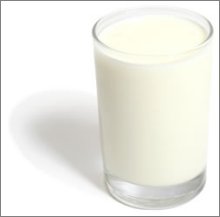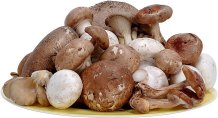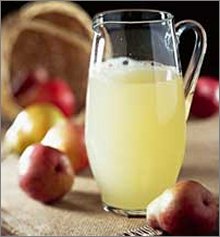The Six Healthiest Staple Foods in Russian Cuisine
by www.SixWise.com
Russia is well known for its long, cold winters, and its
cuisine seems to follow suit: hearty, stick-to-your-ribs types
of foods that are also rich in nutrients and intense flavors
-- just what you need to make it through that kind of weather.
Soups (hot and cold), stews, meat pies and pickled vegetables
are common, as are rye bread, fish dishes, berries and honey,
and sour cream as a condiment. Russian cuisine is packed with
healthy staples, and here we've highlighted six of them, along
with two tasty recipes to try out at the end.
 1.
Fish
1.
Fish
Fish, whether salted, marinated, pickled or smoked, is a
popular part of Russian cuisine, partly because it was the
only meat allowed on fasting days under the Russian Orthodox
Church. Sturgeon, trout and herring are some of the favorites,
as are caviar and fish soups.
Health Benefits: Fish is an excellent source of protein,
as well as omega-3 fatty acids, which have been found to promote
heart health, support neurological development, reduce tissue
inflammation, and help with the symptoms of rheumatoid arthritis,
depression and irritable bowel syndrome.
However, fish must be from a clean source to be considered
healthy, as pollutants
such as mercury that exist in some fish may cause health
problems.
 2.
Kefir
2.
Kefir
Kefir is a tart, yogurt-like beverage made from fermented
milk that is popular in Russia at breakfast as well as an
after-dinner snack. It has been a staple beverage in Russia
since ancient times, and is just beginning to become popular
among health-conscious U.S. consumers.
Health Benefits: Kefir is full of beneficial bacteria (probiotics),
which produce beneficial enzymes, aid digestion and promote
healthy flora in the digestive tract. This nourishing drink
is considered by many to boost the immune system, help fight
disease and improve overall health (it is even customary for
patients in Russian hospitals to receive kefir).
It's simple to make kefir at home using milk and this kefir
starter from Body
Ecology. For those who are sensitive
to dairy, and therefore cannot tolerate regular milk-based
kefir, you can make similarly nutritious coconut
kefir using this recipe.
 3.
Mushrooms
3.
Mushrooms
Mushrooms have always been available in abundance in Russia,
and have become one of the most loved staples of the region.
They're eaten boiled, fried, stewed and pickled, in soups,
salads, meat pies, appetizers, sauces, main dishes and sometimes
as a substitute for meat.
Health Benefits: Mushrooms
are excellent sources of protein, fiber, vitamin C, B vitamins,
calcium and minerals. They also have medicinal properties
that have been found to:
- Promote heart health
- Lower the risk of cancer
- Help balance blood sugar levels
- Reduce high cholesterol
- Fight off viruses, bacteria and fungi
- Boost immune function
- Combat allergies
 4.
Cabbage
4.
Cabbage
Pickled cabbage, or sauerkraut, has long been a staple of
Russian cuisine, originally because it could keep for over
a year, carrying people from one harvest to the next. Cabbage
is also eaten stewed, stuffed, and in soups, or as a popular
side dish cooked with tomato, onion, salt and pepper.
Health Benefits: Cabbage belongs to the healthy cruciferous
family of vegetables. It's known to fight cancer and treat
peptic ulcers, and it's a rich source of vitamin C, fiber,
manganese, vitamin B6 and folate. When cabbage is fermented
into sauerkraut, it has the added benefit of good bacteria
that aid digestion. Note that the typical sauerkraut you find
in stores is NOT fermented -- for an excellent variation on
fermented cabbage see this delicious recipe.
 5.
Kvass
5.
Kvass
Kvass is a popular fermented beverage made from dark sourdough
rye bread that's widely available and even sold from street
vendors. The beverage has a beer-like taste, but is non-alcoholic
(though it turns alcoholic if it's left to ferment long enough),
and has been enjoyed in Russia for at least 1,000 years. Kvass
is also added to chopped meat and vegetables to make a cold
soup.
Health Benefits: Because Kvass is fermented, it contains
beneficial bacteria that are regarded as a digestive aid.
It is also rich in B vitamins, thought to relieve intestinal
problems and hangovers.
 6.
Beets
6.
Beets
Beets (along with cabbage and potatoes) grow very well in
Russia and have long been a staple food in the region's cuisine.
The most famous use for beets is borscht, a beet soup, but
they're also popular boiled, pickled, in salads and as side
dishes.
Health Benefits: Beets
contain beneficial compounds that fight cancer and heart disease,
and they are an excellent source of folate, manganese, potassium,
fiber, vitamin C, and iron. Beets are also considered to help
purify the blood and the liver.
Two Tasty Russian Recipes
Don't miss these authentic Russian recipes that are sure
to add some exciting flavors to your diet.
Sauerkraut & Meat Soup (Plain Shchi)
Ingredients:
1 1/4 pounds beef
1/2 pounds ham
2 1/2 to 3 1/2 cups sauerkraut
1/2 cup sour cream
1 carrot
1 bunch parsley
2 onions
2 potatoes
3 bay leaves,
4 cloves garlic
1 tbsp dill
8 black peppercorns
Method:
- Cover the beef and ham with boiling water
- Add an onion, potatoes and a part of herbs (whole)
- Boil for 1 1/2 hours until the meat is half-ready
- Add the sauerkraut and other chopped onion, and the rest
of the herbs, cut in strips
- Continue to boil for 1 hour
Source: RussianLegacy.com
Mushrooms in Sour Cream
Ingredients:
1 1/2 pounds white mushrooms
2 tbsp butter
2 onions
1 1/2 cups beef stock
1 tbsp flour
1 cup sour cream
Salt and pepper
Method:
- Wash mushrooms in cold water, cut into thin pieces, slicing
the mushroom along its length to preserve its form.
- Place butter in covered pan, add the mushrooms, add some
finely chopped onions that have been separately cooked,
a little salt and pepper, and cook the mushrooms until they
are medium soft, at which point reduce the heat to a very
low level.
- Add beef stock, mixed with flour over very low heat until
the consistency of gravy has been reached, to mushrooms
and then add sour cream and mix.
- Cook on low heat for 10 minutes.
Source: RusCuisine.com
Recommended Reading
The
6 Healthiest Staple Foods in Greek Cuisine
The
6 Healthiest Staple Foods in Italian Cuisine
Sources
RusCuisine.com
RussianFoods.com
The
Weston A. Price Foundation